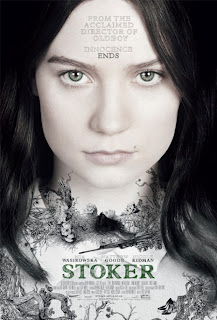I'm choosing to fill a small part of the gray area in my life with random reviews from the realms of cinema, music, and more things that are generally looked down upon by society. And you've chosen to read them apparently.
Tuesday, July 23, 2013
Stoker (2013) Review
During the week of her eighteenth birthday, a young lady by the name of India loses her father in a car accident. While at his funeral, she is introduced to her Uncle Charlie, whose presence she was unaware of until that day. Though India is emotionally distant and still quietly reeling from the loss, it matters not as the newly introduced family member comes to stay in the house almost immediately, with India increasingly becoming more and more suspicious of his true origins and connection to the family.
If you know me decently well enough, you know that I was quite intrigued by the idea of director Park Chan-wook finally making the transition to American cinema after years of excellent overseas work. True, not all Asian directors find success over here. Some get latched onto projects that are simply beyond repair, and others have their own masterpieces remade in order to appeal to simpler audiences (Park's own Oldboy has a remake set for release in the fall). However, I had an unusually good feeling about this one. The man seems like the type who doesn't buckle under pressure, and he can set up diabolically twisted scenes better than most out there.
Perhaps the first shocking thing about Stoker was that Park had nothing to do with its screenplay. Rather, Prison Break actor Wentworth Miller is the man responsible for the film's dark turns, moments of great symbolism, and quiet script. True, he isn't directing himself, but the fact that this screenplay was floating around Hollywood for several years in the "Best Unproduced" category means he may have contributed enough. As I mentioned above, the film is very quiet, almost at times TOO quiet. Mia Wasikowska plays India like a more disturbed, serious version of a Winona Ryder character, or like an older version of the female vampire from the excellent Let the Right One In. Her avoidance and hesitation around the entire cast is utterly convincing, even if her main emotion doesn't seem to change much throughout the first half of the film. Every development she and Charlie go through is fascinating, be it good, bad, or much, much worse.
Charlie himself is played by Matthew Goode, who I can officially say only ruined Ozymandias because of Zack Snyder, and not because of his own acting chops. He is damn good as the new "stranger" to the household, equal parts complex, creepy, charming, and at times sympathetic. Nicole Kidman plays India's mother, and though the Aussie is good like usual, I felt that she was a tad bit underutilized. Her character is clearly struggling to get on her daughter's good side after years of being more or less known as just "the other parent." Her transformation, for what we see of it, could serve as a good side story if we had been given more time. I'm certain that you'll hear a band in the aggressive music scene sample her brilliant ending speech to Goode in a future song (assuming I don't just up and do it myself. Nyah nyah nyah).
As great as the development with the main characters is, the side characters do feel rather paper thin or lifted out of the big book of drama/thriller cliches. The scenes with India at school being harassed by jock bullies feel particularly ancient, and one potential love interest in the film seems to do a 180 for seemingly no rhyme or reason in near record time. I understand high school students are an erratic and occasionally unstable bunch, but this took even me out of the film for a moment. Thankfully it doesn't last for an outrageous amount of time, as Stoker only runs for ninety nine minutes and they ensure you that they are going to try their damndest to pull you back in.
Wook's direction in particular scenes (like a moment with mother and daughter conversing while one uncomfortably combs the other's hair) are signs of a man who's been doing this long enough to make a simple scene work eerily than expected. And on that note, it wouldn't be a CWP film without scenes of great discomfort, and Stoker may turn some viewers off with a couple of scenes that occur midway and towards the end of the film, one of which seems to receive no closure. While nothing matches the Vivaldi teeth-pulling scene of Oldboy, there are some symbolic shots and sequences which could haunt you depending on sensitivity towards the subject matter at hand. The movie's ending has also been up for debate as well, though I may leave that up to you as to how to interpret it.
After I started Stoker, I was sure that the theme at hand was going to be mystery. By the end, I was proven to be dead wrong. Stoker's theme, if you had to narrow it down to absolutely one, is growth. We watch not just the title character(s) grow up or down through odd means, but we're also witnessing the growth of a director who may finally find the recognition among mainstream audiences that he's gotten from the small faithful (i.e. us) throughout the last decade. I'm almost certain that I'll revisit Stoker again in the near future, as there are some moments of symbolism (I apologize for the overuse of that word in this review) that I didn't get upon first glance, but it will have to wait in order for other pictures to be rented and reviewed. If you're in the mood for a criminally overlooked picture from this year, with occasional dips into gothic, demented territory, this is absolutely worth a watch.
Subscribe to:
Post Comments (Atom)

No comments:
Post a Comment